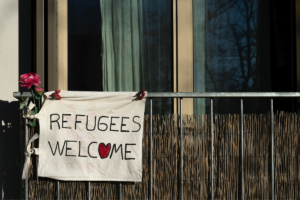Refugees in Georgia

The term “refugee” has become a political weapon, used as a term of aggression, a form of emotional manipulation. But at the heart of it, a refugee represents humanity. Refugees are human beings that are all around us, not a headline from a far-off country. And here in Georgia, and in the Diocese of Atlanta, refugees are finding their way into a new life.
There is amazing work happening in Metro Atlanta. A recent grantee, Memorial Drive Ministries (MDM) is located in Clarkston, the most diverse square mile in North America. MDM clearly states their vision as “the end of disconnectedness for refugees and the diverse community of Clarkston,” along with fostering diverse worshiping communities, innovative social services, and transformative relationships. New American Pathways, an organization resettling refugees throughout Georgia, “welcomed more refugees in the first 6 months of 2022 than in the previous two years combined.”[1] And in 2022, Episcopal Migration Ministries, one of ten national agencies working with the State Department and the refugee resettlement ministry of The Episcopal Church, resettled 1,639 individuals from 30 countries.
Refugees in the US
According to the Migration Policy Institute, “more refugees arrived in the United States in the first eight months of fiscal year (FY) 2023 than any year since FY 2017” (MPI) . There are many reasons why one may become a refugee: war, economic opportunity, fleeing persecution. “Nationals of the Democratic Republic of the Congo (DRC), Myanmar, and Syria were the top origin groups in the first eight months of FY 2023, representing 59 percent of arrivals (approximately 18,700 individuals)”(MPI). Nationals from all three countries have been forced to reckon with armed conflict, civil wars, political instability, and human rights abuses in their homeland. While the US has provided great opportunity for many refugees, the unfortunate truth is that aid changes and is withdrawn depending on the political group in power. We are especially called to love and support as best we can, especially where the political systems or policies fail.
The Requirement for Empathy
Caring for refugees requires empathy. It requires us to think outside of our own experiences. It requires us to care enough about the “other” to move into action. According to The National Child Traumatic Stress Network, “refugees may face stressors in four major categories: 1. Traumatic Stress (war, famine, poverty). 2. Acculturation Stress (navigating a new culture with their culture of origin). 3. Resettlement Stress (housing, food, transportation). And 4. Isolation (not “fitting in”, separation from family, isolation)” (NCTSN). For most of us, we have not had to deal with these stressors. It is imperative that we are able to consider these experiences outside of ourselves. In doing so, we give way to the voices that desperately need to be heard. It is not only ok, it is necessary to step aside, and allow others to step in to share their stories.
[1] New American Pathways, 2022 Impact Report [Download PDF]

